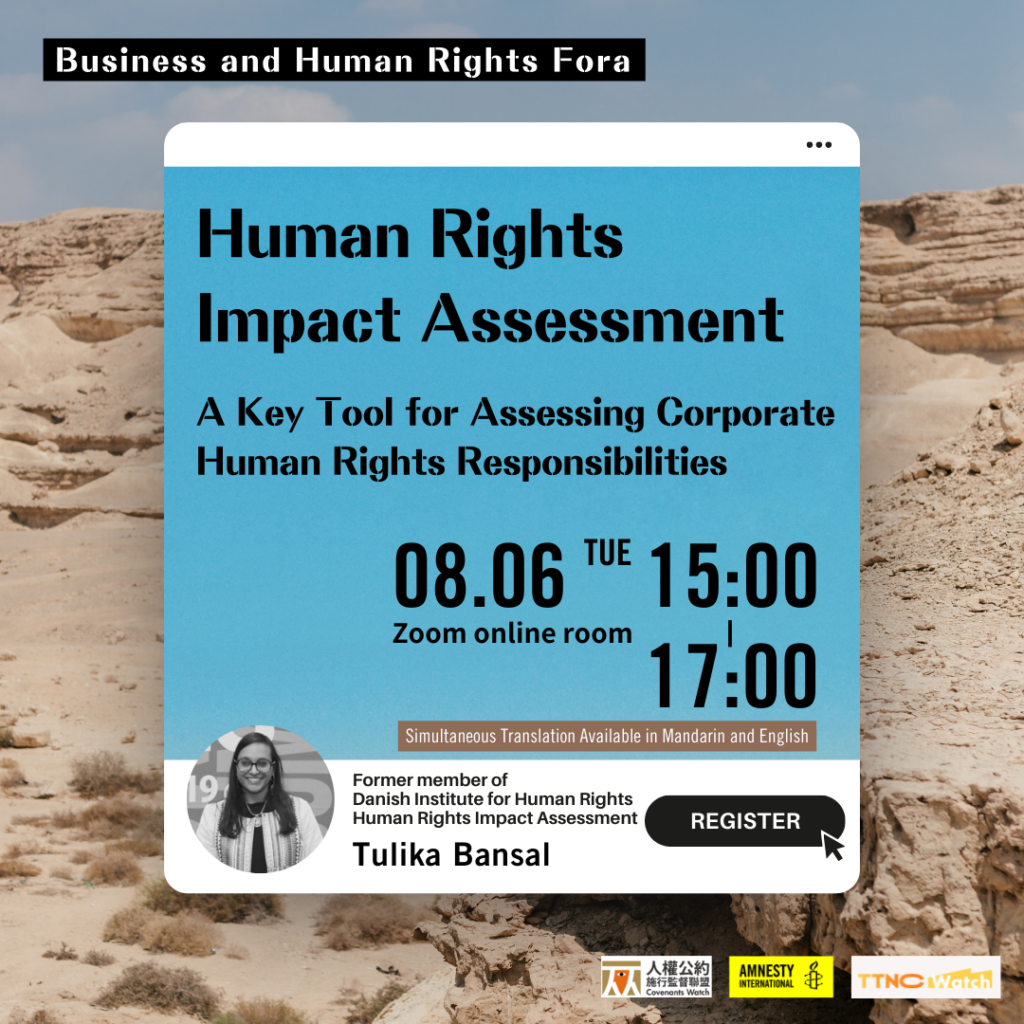Business and Human Rights Fora: OECD MNE Guidelines Reforms and Reflections
Time: July 9, 2024 (Tuesday) 15:00-17:00 Taipei time
Location: online meeting (zoom)
Speakers:
- Marian G. Ingrams|Director, OECD Watch
- (More speakers are being confirmed)
Host:
- Eeling Chiu|Executive Director, Amnesty International Taiwan
Registration: https://forms.gle/535KperhYsCvzJmv7 (Registration is open until July 8th 12 p.m. or until the quota is full)
Language: Mainly in English, with simultaneous interpretation in Chinese
—Organizers—
- Amnesty International Taiwan
- Covenants Watch
- Taiwan Transnational Corporations Watch (TTNC Watch)
Continuing the discussion of the EU Corporate Sustainability Due Diligence Directive (CSDDD) in the first lecture, the second lecture expands the regional scope and focuses on the efforts of the Organization for Economic Cooperation and Development (OECD) in establishing a set of international standards and solutions to address social, economic and environmental development and challenges, and provide sustainable development recommendations to multinational enterprises. As early as 1976, the OECD proposed the “Multinational Enterprise Guidelines” (MNE Guidelines) to formulate a code of conduct for large multinational enterprises. In this guideline, the OECD proposes “responsible business conduct” that enterprises should abide by, aiming to expect all enterprises, regardless of size, to avoid and resolve the negative impacts of their operations and contribute to the sustainable development of the region.
In 2023, the OECD released an updated version of the MNE Guidelines, which is the biggest change since the 2011 revision. The new version of the guidelines reviewed the rapid political, economic and social changes faced by multinational enterprises in the past decade, and integrated the experience and reflections of the guidelines in practice in various countries. Continuing the old version of the guidelines, the new version also emphasizes “risk-based due diligence” and expects companies to identify, prevent and mitigate negative human rights impacts. In addition, the new version of the guidelines still expects member states to set up a multilateral, transnational, non-judicial complaint mechanism – National Contact Point (NCP). Besides promoting MNE Guidelines within member states, NCP is for people to file complaints against corporate violations. After NCP evaluates the complaint, it may reach a consensus between both parties through non-adversarial procedures such as reconciliation or mediation; it will also continue to follow up after the case is over to confirm whether the agreement has been completed.
In the second lecture of the business and human rights fora, we invite Marian G. Ingrams from OECD Watch to share her experiences and reflections on OECD MNE Guidelines. Another speaker is under the confirmation process. If you are interested in how OECD guides enterprises to implement responsible business conduct or how people can file complaints against corporate behaviors, please join us in this lecture!

-1024x1024.png)
-1024x1024.jpg)
